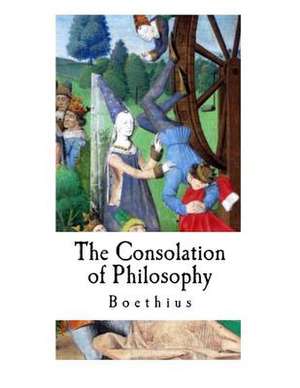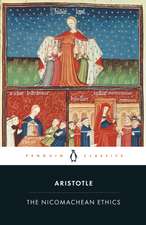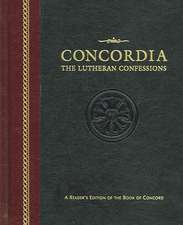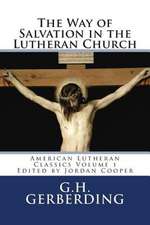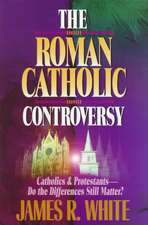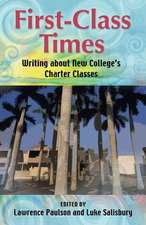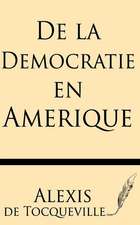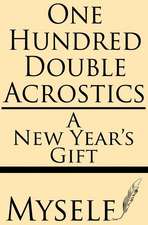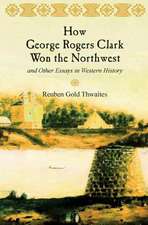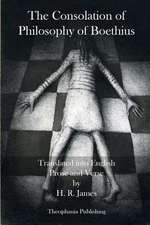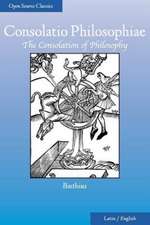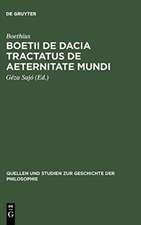The Consolation of Philosophy
Autor Boethius Traducere de H. R. Jamesen Limba Engleză Paperback
| Toate formatele și edițiile | Preț | Express |
|---|---|---|
| Paperback (14) | 40.85 lei 3-5 săpt. | |
| – | 40.85 lei 3-5 săpt. | |
| CREATESPACE – | 46.82 lei 3-5 săpt. | |
| Dover Publications – 31 mar 2002 | 50.27 lei 3-5 săpt. | |
| OUP OXFORD – 10 iul 2008 | 52.51 lei 10-16 zile | +18.00 lei 7-13 zile |
| – | 64.40 lei 3-5 săpt. | |
| – | 69.21 lei 3-5 săpt. | |
| CREATESPACE – | 77.12 lei 3-5 săpt. | |
| Hackett Publishing Company – oct 2001 | 120.71 lei 3-5 săpt. | |
| Digireads.com – 17 sep 2018 | 58.72 lei 6-8 săpt. | |
| Lulu.Com – 25 aug 2019 | 84.60 lei 6-8 săpt. | |
| BLURB INC – 18 ian 2019 | 88.68 lei 17-23 zile | |
| Martino Fine Books – 11 ian 2016 | 99.05 lei 38-44 zile | |
| Indoeuropeanpublishing.com – 21 iun 2019 | 100.44 lei 6-8 săpt. | |
| Martino Fine Books – 2 iun 2011 | 108.24 lei 38-44 zile | |
| Hardback (4) | 170.64 lei 6-8 săpt. | +39.78 lei 7-13 zile |
| Hackett Publishing Company – oct 2001 | 340.45 lei 3-5 săpt. | +55.85 lei 7-13 zile |
| Lulu.Com – 25 aug 2019 | 170.64 lei 6-8 săpt. | +39.78 lei 7-13 zile |
| Indoeuropeanpublishing.com – 21 iun 2019 | 191.66 lei 6-8 săpt. | |
| OUP OXFORD – 28 ian 1999 | 1239.01 lei 31-37 zile |
Preț: 64.40 lei
Nou
12.32€ • 12.96$ • 10.18£
Carte disponibilă
Livrare economică 26 martie-09 aprilie
Specificații
ISBN-10: 1537363751
Pagini: 98
Dimensiuni: 216 x 279 x 5 mm
Greutate: 0.25 kg
Cuprins
Descriere
Boethius composed the De Consolatione Philosophiae in the sixth century AD whilst awaiting death under torture, condemned on a charge of treason which he protested was manifestly unjust. Though a convinced Christian, in detailing the true end of life which is the soul's knowledge of God, he consoled himself not with Christian precepts but with the tenets of Greek philosophy. This work dominated the intellectual world of the Middle Ages; writers as diverseas Thomas Aquinas, Jean de Meun, and Dante were inspired by it.
In England it was rendered in to Old English by Alfred the Great, into Middle English by Geoffrey Chaucer, and later Queen Elizabeth I made her own translation. The circumstances of composition, the heroic demeanour of the author, and the'Menippean' texture of part prose, part verse have combined to exercise a fascination over students of philosophy and literature ever since. ABOUT THE SERIES: For over 100 years Oxford World's Classics has made available the widest range of literature from around the globe.
Each affordable volume reflects Oxford's commitment to scholarship, providing the most accurate text plus a wealth of other valuable features, including expert introductions by leading authorities, helpful notes to clarify the text, up-to-date bibliographies for further study, and much more.
Recenzii
Entirely faithful to Boethius' Latin; Relihan's translation makes the philosophy of the Consolation intelligible to readers; it gives equal weight to the poetry--in fact, Relihan's metrical translation of Boethius' metro are themselves contributions of the first moment to Boethian studies. Boethius finally has a translator equal to his prodigious talents and his manifold vision. --Joseph Pucci, Brown University
This book offers a splendid new translation of the Consolatio Philosophiae that makes the philosophy of the text accessible to both the beginning student and to the Latin scholar. Any student interested in the transition in late antiquity from the pagan to the Christian worlds should own this volume. --Victoria Jordan, The Classical Outlook
Relihan's edition of the Consolation offers both student and scholar a felicitous text, expertly translated from the original Latin, richly supplemented throughout with a critical apparatus, and generously embellished with explanatory notes for each prose and metric portion; he offers an Introduction of clear-sighted analysis, and an inclusive, text-referential glossary. Relihan's translation should now be the standard text for classroom use. . . . Relihan has performed a great service in his translation by attempting to translate the 'meters' with the sensibility of a poet as well as a Latinist, and it has made his version of Consolation that much more committed, it seems, to the intent of the original, and definitely a more compelling read. Relihan, as he himself states, has done '. . . what has not been done before in the long history of translation of Consolation into English, . . . [to] reproduce through English accents the rhythms and meters of the original poems' (xxviii). . . . The poetic sections of Consolation are not mere interludes but deliberate transitions in tenor and signification. By offering an English text that echoes the Latin in form, Relihan is offering the student of Consolation an English text that echoes the Latin in meaning as well. It is an offer neither scholar nor student should refuse. --June-Ann Greeley, New England Classical Journal
